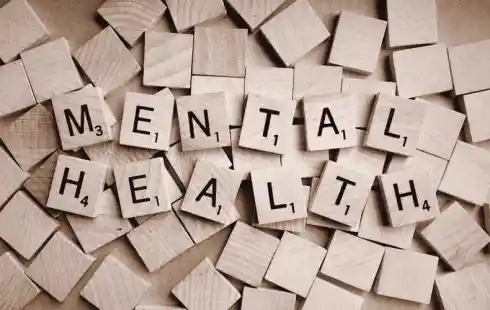Tohru in der Schreiberei, Munich's newest three-Michelin-star restaurant
Section: Arts
 In a world that often seems to move at a relentless pace, the importance of mental health cannot be overstated. Despite the growing recognition of mental health issues, a pervasive stigma has shrouded these issues in silence. Now, more than ever, breaking that silence has become a rallying cry for individuals, communities, and organizations worldwide.
In a world that often seems to move at a relentless pace, the importance of mental health cannot be overstated. Despite the growing recognition of mental health issues, a pervasive stigma has shrouded these issues in silence. Now, more than ever, breaking that silence has become a rallying cry for individuals, communities, and organizations worldwide.
Mental health disorders affect millions of people globally, cutting across age, gender, and socio-economic boundaries. According to the World Health Organization (WHO), one in four people will be affected by mental or neurological disorders at some point in their lives. The prevalence of mental health issues highlights the need for open conversations and initiatives aimed at destigmatizing these conditions.
The Toll of Silence
Silence surrounding mental health not only perpetuates stereotypes but also prevents those struggling from seeking help. Individuals often fear judgment, discrimination, or being labeled as weak. This silence can have profound consequences, leading to increased suffering, impaired relationships, and in some cases, tragic outcomes like suicide.
Shifting Perspectives: From Stigma to Understanding
Efforts to break the silence on mental health are gaining momentum globally. Celebrities, public figures, and everyday people are sharing their own experiences, challenging preconceptions, and fostering empathy. These voices, once confined to the shadows, are now stepping into the spotlight to encourage open dialogue and understanding.
Community Initiatives Making Waves
Communities are playing a pivotal role in this shift. Local organizations are organizing events, workshops, and awareness campaigns to educate the public about mental health. Schools are incorporating mental health education into their curricula, nurturing a generation that is more aware and empathetic towards mental health challenges.
One such initiative is the "Minds Matter" campaign, a grassroots movement that originated in a small town and has now spread globally. This campaign focuses on creating safe spaces for people to share their stories, fostering a sense of community, and emphasizing that seeking help is a sign of strength, not weakness.
Corporate Responsibility: Beyond the Bottom Line
Recognizing the impact of mental health on productivity and employee well-being, many corporations are reevaluating their approach to mental health in the workplace. Employee assistance programs, mental health days, and training sessions on stress management are becoming integral parts of company policies. This marks a departure from the traditional view of mental health as a private matter and highlights the growing acknowledgment of its broader societal impact.
Technology as a Catalyst for Change
In the digital age, technology is playing a crucial role in amplifying the conversation around mental health. Social media platforms provide a space for individuals to share their stories, connect with support networks, and access resources. Mental health apps offer tools for self-care, meditation, and mood tracking, making mental health support more accessible than ever.
However, the digital landscape also brings challenges, such as cyberbullying and the potential for misinformation. Striking a balance between the positive and negative aspects of technology in mental health awareness is essential for ensuring a healthy and supportive online environment.
Governmental Commitments and Policy Changes
Governments around the world are recognizing the urgency of addressing mental health issues. Increased funding for mental health services, the integration of mental health into primary healthcare, and the development of comprehensive mental health policies are steps in the right direction. Legislative changes aimed at protecting the rights of individuals with mental health conditions contribute to an environment where seeking help is encouraged rather than stigmatized.
The Role of Education
Education is a powerful tool in dispelling myths and promoting understanding. Integrating mental health education into school curricula helps young people develop emotional intelligence, empathy, and the ability to navigate their own mental well-being. By fostering an open dialogue from a young age, societies can work towards creating a future where mental health is prioritized and destigmatized.
Breaking the Silence: A Collective Effort
Breaking the silence on mental health issues requires a collective effort from individuals, communities, corporations, and governments. It involves fostering a culture of empathy, understanding, and support. By dismantling the barriers that keep mental health hidden in the shadows, we pave the way for a more compassionate and resilient society.
As we continue to raise awareness and challenge the stigma surrounding mental health, it is crucial to remember that each conversation, each initiative, and each step forward contributes to a larger, collective movement. Breaking the silence is not just a goal; it is an ongoing process that requires commitment, compassion, and a shared understanding that mental health is an integral part of our overall well-being.
Section: Arts

Section: Health

Section: Fashion

Section: Politics

Section: Fashion

Section: News

Section: Fashion

Section: Arts

Section: Politics

Section: Health Insurance
Both private Health Insurance in Germany and public insurance, is often complicated to navigate, not to mention expensive. As an expat, you are required to navigate this landscape within weeks of arriving, so check our FAQ on PKV. For our guide on resources and access to agents who can give you a competitive quote, try our PKV Cost comparison tool.
Germany is famous for its medical expertise and extensive number of hospitals and clinics. See this comprehensive directory of hospitals and clinics across the country, complete with links to their websites, addresses, contact info, and specializations/services.
Join us at the Kunstraum in der Au for the exhibition titled ,,Ereignis: Erzählung" by Christoph Scheuerecker, focusing on the captivating world of bees. This exhibition invites visitors to explore the intricate relationship between bees and their environment through various artistic expressions,...



No comments yet. Be the first to comment!